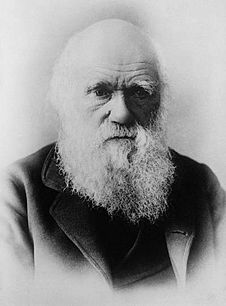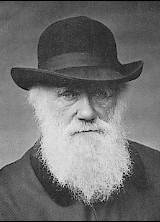Religious Views Of Charles Darwin
 From Conservapedia
From Conservapedia 
The evolutionist Charles Darwin likely abandoned Christianity as a student when he disappointed his father by refusing to become a minister. In his autobiography Charles Darwin wrote about the diminishment of his religious faith and Darwin stated that he was an agnostic.[3] Darwin wrote the following: "The mystery of the beginning of all things is insoluble to us; and I for one must be content to remain an Agnostic."[4] However, Darwin stated in his private notebooks that he was a materialist, which is a type of atheist.[5] [6][7] In the 1996 British Journal for the Philosophy of Science Kim Sterelny wrote in a book review the following: "I have no doubt that Darwin was a materialist and a mechanist..."[8] Furthermore, Charles Darwin’s casual mentioning of a ‘creator’ in earlier editions of The Origin of Species appears to have been a merely a ploy to downplay the implications of his materialistic theory.[9] Creation Ministries International states the following regarding why it is maintained that Charles Darwin was privately a materialist:
| “ | Ernst Mayr’s recent book on Darwin, One Long Argument: Charles Darwin and the Genesis of Evolutionary Thought, Harvard, 1991, also acknowledges that Darwin’s references to purpose were to appease both the public and his wife. His early, private notebooks show his materialism well established. For instance, in one of them he addresses himself as, ‘O, you materialist!’ and says, ‘Why is thought, being a secretion of brain, more wonderful than gravity as a property of matter?’ He clearly already believed that the idea of a separate realm of the spirit was nonsense, as is further shown when he warns himself not to reveal his beliefs, as follows:
‘to avoid saying how far I believe in materialism, say only that emotions, instincts, degrees of talent which are hereditary are so because brain of child resembles parent stock.’[10] |
” |
Scholars refer to the private notebook in which Charles Darwin stated he was a materialist as the "M" notebook of 1838.[11] Ernst Mayr wrote that "It is apparent that Darwin lost his faith in the years 1836-39, much of it clearly prior to the reading of Malthus. In order not to hurt the feelings of his friends and of his wife, Darwin often used deistic language in his publications, but much in his Notebooks indicates that by this time he had become a 'materialist' (more or less = atheist)".[12]
Perhaps the best explanation of Darwin's worldview from 1836 onwards was that Darwin was a weak atheist who often had overwhelming thoughts that nature was the product of a mind.[13][14][15] For example, Darwin wrote the following:
| “ | Dr. Aveling has published an account of a conversation with my father. I think that the readers of this pamphlet ('The Religious Views of Charles Darwin,' Free Thought Publishing Company, 1883) may be misled into seeing more resemblance than really existed between the positions of my father and Dr. Aveling: and I say this in spite of my conviction that Dr. Aveling gives quite fairly his impressions of my father's views. Dr. Aveling tried to show that the terms "Agnostic" and "Atheist" were practically equivalent-that an atheist is one who, without denying the existence of God, is without God, inasmuch as he is unconvinced of the existence of a Deity. My father's replies implied his preference for the unaggressive attitude of an Agnostic. Dr. Aveling seems (page 5) to regard the absence of aggressiveness in my father's views as distinguishing them in an unessential manner from his own. But, in my judgment, it is precisely differences of this kind which distinguish him so completely from the class of thinkers to which Dr. Aveling belongs.[16] | ” |
The Stanford Encyclopedia of Philosophy declares:
| “ | In 1885, the Duke of Argyll recounted a conversation he had had with Charles Darwin the year before Darwin's death:
In the course of that conversation I said to Mr. Darwin, with reference to some of his own remarkable works on the Fertilisation of Orchids, and upon The Earthworms, and various other observations he made of the wonderful contrivances for certain purposes in nature—I said it was impossible to look at these without seeing that they were the effect and the expression of Mind. I shall never forget Mr. Darwin's answer. He looked at me very hard and said, “Well, that often comes over me with overwhelming force; but at other times,” and he shook his head vaguely, adding, “it seems to go away.”(Argyll 1885, 244) [17] |
” |
Scientism can also be seen in Darwin's worldview. The scientism in Darwins's worldview can be seen in the following quote of Darwin:
| “ | It appears to me (whether rightly or wrongly) that direct arguments against Christianity and theism produce hardly any effect on the public; and freedom of thought is best promoted by the gradual illumination of men's minds which follows from the advance of science.[18] | ” |
According to Charles Darwin the "manifestly false history of the world" [19] as recorded in the Old Testament and New Testament miracles led him to reject Biblical veracity.[20] Eminent Darwin biographer, Professor Janet Browne, sums up Darwin's views concerning religion: Darwin "mapped out a comparative evolution of the religious sense, proposing that religious belief was ultimately nothing more than a primitive urge to bestow a cause on otherwise inexplicable natural events...In short, he made no secret of his view that he did not believe religion to have any rational foundation at all".[21] When he died in 1882 at the age of seventy-three, Darwin was buried at Westminster Abbey next to Sir Isaac Newton.
There exists in hostile Darwin literature a story about a Christian called Lady Hope who visited and spoke with a dying Charles Darwin. This appears to be merely a legend, and there is no evidence that Lady Hope ever converted or even visited Darwin on his deathbed.[22]
See also[edit]
References[edit]
- ↑ http://plato.stanford.edu/entries/teleological-arguments/notes.html
- ↑ http://www.darwinproject.ac.uk/entry-2109
- ↑ http://www.update.uu.se/~fbendz/library/cd_relig.htm
- ↑ http://www.update.uu.se/~fbendz/library/cd_relig.htm
- ↑ http://www.creationontheweb.com/content/view/1877
- ↑ Barrett, Paul H. Darwin on Man 1974:276
- ↑ American Scientist May 1977:323
- ↑ http://www.jstor.org/view/00070882/ap020188/02a00130/1?frame=noframe&userID=80cdbf39@buffalo.edu/01cce4405c00501c2c38a&dpi=3&config=jstor British Journal for the Philosophy of Science, Volume 47, 1996, page 641
- ↑ http://www.creationontheweb.com/content/view/1877
- ↑ http://www.creationontheweb.com/content/view/1877
- ↑ Barrett, Paul H. Darwin on Man 1974:276
- ↑ American Scientist May 1977:323
- ↑ http://plato.stanford.edu/entries/teleological-arguments/notes.html
- ↑ https://books.google.com/books?id=j9MEAAAAYAAJ&pg=PA65&lpg=PA65&dq=Dr.+Aveling+has+published+an+account+of+a+conversation+with+my+father.+I+think+that+the+readers+of+this+pamphlet+('The+Religious+Views+of+Charles+Darwin,'+Free+Thought+Publishing+Company,+1883)+may+be+misled+into+seeing+more+resemblance+than+really+existed&source=web&ots=-eyumeD-3g&sig=V1ooJ7WLHqu1csnVz39scxdV4Mg&hl=en&sa=X&oi=book_result&resnum=1&ct=result
- ↑ http://www.equip.org/site/c.muI1LaMNJrE/b.2548839/k.2A55/Is_Darwinism_Atheistic_an_Examination_of_the_Beliefs_and_Practices_of_Charles_Darwin.htm
- ↑ https://books.google.com/books?id=j9MEAAAAYAAJ&pg=PA65&lpg=PA65&dq=Dr.+Aveling+has+published+an+account+of+a+conversation+with+my+father.+I+think+that+the+readers+of+this+pamphlet+('The+Religious+Views+of+Charles+Darwin,'+Free+Thought+Publishing+Company,+1883)+may+be+misled+into+seeing+more+resemblance+than+really+existed&source=web&ots=-eyumeD-3g&sig=V1ooJ7WLHqu1csnVz39scxdV4Mg&hl=en&sa=X&oi=book_result&resnum=1&ct=result
- ↑ http://plato.stanford.edu/entries/teleological-arguments/notes.html
- ↑ http://www.christianitytoday.com/books/features/bccorner/020204.html
- ↑ ibid. Barlow 1958:85.
- ↑ ibid. Barlow 1958:85-87.
- ↑ Browne, Janet Charles Darwin The Power of Place 2002:341
- ↑ http://www.carm.org/evo_questions/deathbed.htm
Categories: [Charles Darwin]
↧ Download as ZWI file | Last modified: 03/06/2023 14:42:40 | 15 views
☰ Source: https://www.conservapedia.com/Religious_views_of_Charles_Darwin | License: CC BY-SA 3.0
 ZWI signed:
ZWI signed:
 KSF
KSF